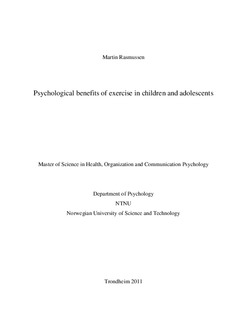| dc.contributor.advisor | Laumann, Karin | nb_NO |
| dc.contributor.author | Rasmussen, Martin | nb_NO |
| dc.date.accessioned | 2014-12-19T14:42:03Z | |
| dc.date.available | 2014-12-19T14:42:03Z | |
| dc.date.created | 2011-09-13 | nb_NO |
| dc.date.issued | 2011 | nb_NO |
| dc.identifier | 440643 | nb_NO |
| dc.identifier.uri | http://hdl.handle.net/11250/270678 | |
| dc.description.abstract | The main research question for this paper was; does adolescent exercise predict happiness and positive moods in adult life? Data was collected through an online questionnaire (N = 438). The questionnaire included a measure of happiness (The Subjective Happiness Scale), moods (The Profile of Mood States) and questions on current and adolescent exercise. Adolescent exercise was a significant predictor for positive moods, even when controlling for current exercise. This is as far as we know the first study to find this connection. There is also a connection between adolescent exercise and happiness, although it appears to be that adolescent exercise predicts exercise in adult life, which in turn has a connection to happiness. Exercise was not a significant predictor of negative moods in adulthood. | nb_NO |
| dc.description.abstract | This review examines the psychological benefits exercise lead to in healthy children and adolescents. Studies on the effect of exercise on cognition, self-esteem, emotions and mood, and academic performance were examined. Exercise seems to have a positive effect on several aspects of cognition and self-esteem in healthy children and adolescents. There is not sufficient evidence to conclude that there are benefits from exercise in emotions, mood and academic performance. | nb_NO |
| dc.language | eng | nb_NO |
| dc.publisher | Norges teknisk-naturvitenskapelige universitet, Fakultet for samfunnsvitenskap og teknologiledelse, Psykologisk institutt | nb_NO |
| dc.subject | Social and Behavioural Science, Law | en_GB |
| dc.title | Psychological benefits of exercise in children and adolescents | nb_NO |
| dc.type | Master thesis | nb_NO |
| dc.source.pagenumber | 66 | nb_NO |
| dc.contributor.department | Norges teknisk-naturvitenskapelige universitet, Fakultet for samfunnsvitenskap og teknologiledelse, Psykologisk institutt | nb_NO |
